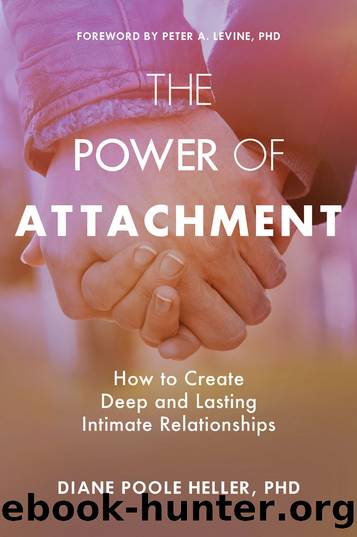The Power of Attachment by Diane Poole Heller

Author:Diane Poole Heller
Language: eng
Format: epub
Publisher: Sounds True
Distinguishing the Self and Restoring Connection
Admittedly, giving loved ones more space and learning how to soothe ourself can be particularly challenging for those of us with ambivalent attachment, so I want to offer another angle here. Consider this: People with ambivalent attachment are uniquely gifted. We walk through the world with incredible sensitivity and capacity. We are able to resonate with others deeply, know them well (sometimes picking up on what they need even before they do), and focus on them in unique ways. I want to recognize how precious that gift is while at the same time help you foster the ability to connect with yourself, because living with a self-connection deficit means that we will struggle in life far more than is good for us. It’s too painful to be out-of-touch with ourself, especially when the techniques for living otherwise are readily at hand.
One way to try this out is by looking at the you of you. What does that mean? Well, taking myself as an example, what do I mean when I refer to myself? Who is the Diane of Diane-ness? I know it sounds a little silly (and it is), but what I’m trying to get at is that special sense of you—your own individual experience in the present moment. What emotions are you feeling? What’s going on in your body? What thoughts are popping up and connecting and dissolving? Apply some kind attention and take a look at your unique experience as it comes and goes, moment by moment. Dan Siegel has an exercise I recommend called the “Wheel of Awareness” in which he also points out the importance of learning how to connect with ourself authentically and practice shifting our awareness to different modes of perception.7
Ambivalent people have a tremendous amount to gain from restoring a sense of self-connection. Among other things, it allows us to develop more relational sensitivity, true mutuality, and resiliency. As I’ve mentioned before, being more in touch with ourself improves our ability to understand and relate to others; it also enables us to attune to the dynamic field that arises when we’re in relationship with another person.
It can sometimes be difficult for those of us with the ambivalent adaptation to attune to ourself while in the presence of others. This can be confusing, but it isn’t necessarily an obstacle. If this struggle sounds familiar to you, try the following exercise. It’s meant to help you experience healthy boundaries and maintain self-connection while in the presence of others.
Download
This site does not store any files on its server. We only index and link to content provided by other sites. Please contact the content providers to delete copyright contents if any and email us, we'll remove relevant links or contents immediately.
Rewire Your Anxious Brain by Catherine M. Pittman(17581)
Talking to Strangers by Malcolm Gladwell(11865)
The Art of Thinking Clearly by Rolf Dobelli(8836)
Mindhunter: Inside the FBI's Elite Serial Crime Unit by John E. Douglas & Mark Olshaker(7830)
Becoming Supernatural by Dr. Joe Dispenza(7100)
Change Your Questions, Change Your Life by Marilee Adams(6637)
Nudge - Improving Decisions about Health, Wealth, and Happiness by Thaler Sunstein(6629)
The Road Less Traveled by M. Scott Peck(6627)
The Lost Art of Listening by Michael P. Nichols(6465)
Enlightenment Now: The Case for Reason, Science, Humanism, and Progress by Steven Pinker(6404)
Win Bigly by Scott Adams(6306)
Mastermind: How to Think Like Sherlock Holmes by Maria Konnikova(6227)
The Way of Zen by Alan W. Watts(5790)
Daring Greatly by Brene Brown(5636)
Grit by Angela Duckworth(4729)
Big Magic: Creative Living Beyond Fear by Elizabeth Gilbert(4719)
Men In Love by Nancy Friday(4315)
Flow by Mihaly Csikszentmihalyi(4047)
The Four Tendencies by Gretchen Rubin(4018)
